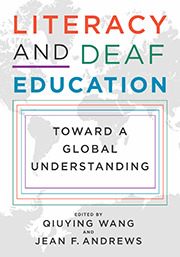Toward a Global Understanding
Qiuying Wang and Jean F. Andrews, Editors
Foreword by Donald Moores and Margery Miller
September 2020
| Table of contents List of contributors Excerpt View signed chapter summaries. |
$95.00 (s) hardcover, ebook |
“A key strength is that the book offers insight into regions often overlooked, such as Africa, Asia, and the Middle East, and examines themes ranging from reading intervention programs to visual learning techniques. Such diverse perspectives enrich the collection while deepening readers' understanding of how to make reading more pleasurable for all deaf students worldwide ... Highly recommended.”
“By having information provided in this book, one can more competently analyze universal theoretical models of literacy development of deaf and hard-of-hearing children and pinpoint universal challenges in learning to read and write, beyond the constraints of a specific language...To conclude, I see this book as a valuable resource to (international) researchers, students, and professionals working with deaf and hard-of-hearing children and students who are interested in literacy issues in deaf education on a global scale.”
International perspectives about literacy and deaf students is an uncharted intellectual landscape. Much of the literacy research in deaf education is conducted in English-speaking countries—primarily the United States—but 90% of deaf children live outside the U.S. and learn various signed and spoken languages, as well as diverse writing systems. Many of these children face significant educational challenges. In order to improve the literacy outcomes of deaf students around the world, it is imperative to study how children are using their local signed and spoken languages along with Deaf culture to learn to read and write. This volume fills a void in the field by providing a global view of recent theoretical and applied research on literacy education for deaf learners.
Literacy and Deaf Education: Toward a Global Understanding is organized by region and country, with the first part discussing writing systems that use alphabetic scripts, and the second part focusing on countries that use non-alphabetic scripts. Some examples of the wide spectrum of topics covered include communication methodologies, curriculum, bilingual education, reading interventions, script diversity, and sociocultural development, including Deaf cultural developments. The contributors provide the results from literacy projects in fifteen countries and regions.
This volume aims to widen the knowledge base, familiarize others in the field with these initiatives, and improve global understandings and outcomes of literacy teaching and learning in deaf education from birth to high school.
Visit the Gallaudet University Press YouTube Channel to view signed summaries of the chapters. Under Playlists, click “Literacy and Deaf Education: Chapter Summaries.”
Qiuying Wang is Professor in the School of Teaching, Learning, and Educational Sciences at Oklahoma State University. Her work focuses on cross-cultural and cross-linguistic comparative perspectives on literacy education.
Jean F. Andrews is Distinguished Professor Emerita from the Department of Deaf Studies and Deaf Education at Lamar University in Beaumont, Texas. Her research interests include how sign language supports language and literacy, Deaf culture, ASL and English bilingualism, children’s literature, and forensic literacy assessments for Deaf persons in the criminal justice system.
Hardcover
ISBN 978-1-944838-67-6
466 pages. 7 x 10. 44 figures, 27 tables.
$95.00 (s)
Ebook
ISBN 978-1-944838-69-0
$95.00

